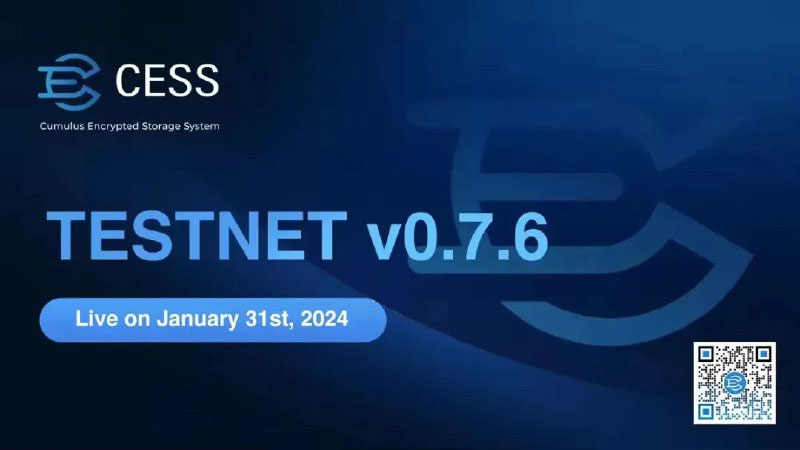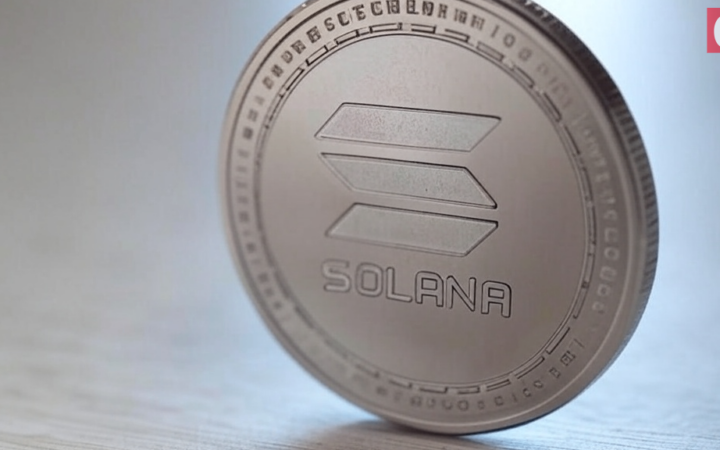
Decentralized Storage Network CESS Launched Testnet v0.7.6 on January 31

/CESS/ – Cumulus Encrypted Storage System (CESS) continues to reimagine the future of decentralized data storage and content delivery network infrastructure that is vastly used by the fast-growing Web3 industry. As of this report, the CESS protocol had a total storage capacity of about 8029 TiB with a 99.9 percent availability rate in its short history. The company intends to build further on its success, especially after completing its Series A funding round with $8 million with crucial participation from HTX Ventures, Infinity Ventures Crypto, DWF Labs, Mentha Partners, Vespertine Capital, Web3 Foundation, Singchain Investment, 7 O’Clock Capital, SolrDAO, FishDAO, OneBlock+, Winkrypto, and Polkadot Ecology Research Institute. The demand for decentralized storage is expected to grow exponentially in the coming years, especially with the involvement of institutional investors and governments in the Web3 space and digital assets.
Closer Look at CESS Testnet v0.7.6
After months of crucial research and developments, the CESS team led by Chairman Nicholas Zaldastini has officially launched the testnet v0.7.6 on Wednesday, January 31. According to the announcement, the CESS ecosystem should prepare accordingly for a series of upgrades and updates that will ensure seamless commercial use for its decentralized cloud storage network. Moreover, the company has already completed 12 rounds of testnet upgrades that engaged more than 40,000 nodes.
The company noted in the announcement:
“We extend our special thanks to the miners who have actively invested in testing and have been steadfast companions in CESS’s continuous growth. With the mainnet launch imminent, let us collectively embrace the upcoming Incentive Testnet v0.7.6. Below, you will find detailed introductions to the new features and updates in CESS-v0.7.6.”
Changes Expected for Storage Nodes
With the CESS testnet v0.7.6, the storage node operators have been promised a better experience with fixing the issues that were discovered in prior testnets. On the top list, the CESS testnet v0.7.6 will encompass an optimized storage node economic model, which includes an adjustment to reward release, penalty, and node exit mechanism. As for the storage miners, the testnet will ensure that they share 20,000 points in total, which is equivalent to 2,000,000 CESS tokens. Notably, the final points for each storage miner are calculated based on the percentage of the miner’s contributed storage power relative to the network’s total storage power.
For example, if the total storage power of the entire network is 10,000 GiB, and Miner A possesses an effective power of 100 GiB at the test’s conclusion, Miner A will be awarded 200 points for this round. Meanwhile, every storage miner has to contribute at least 1 G in storage power in order to qualify.
As for the Consensus nodes that run successfully throughout the entire testing period, the company intends to reward them with 50 points. On the side of miner rewards, the company highlighted that the information will be posted on the CESS Twitter account. Additionally, the miner rewards will be distributed at a ratio of 1:100, whereby 1 point is equivalent to 100 CESS tokens after the CESS mainnet goes live.
The CESS testnet v0.7.6 will also introduce improved storage node pledging, whereby node operators will support the same account for pledging, earnings, and signing different accounts for each. In a bid to ensure optimized data security, storage node operators are also expected to ensure improved details of the multiple backup recoverable storage proof mechanism. With the CESS testnet v0.7.6, the team promises high optimization of storage node processes like idle space authentication, random challenges, and file recovery.
The latest CESS testnet will ensure the addition of storage node runtime monitoring in a bid to improve the network’s ability to identify storage mode status. Additionally, the CESS team has promised improved manuals for storage node and consensus node operations
Upgrades and Updates for Consensus Nodes
As for the consensus nodes, the CESS testnet v0.7.6 will introduce optimized TEE worker registration, which allows independent and multi-node registration. The latest iteration will also ensure an enhanced idle space proof algorithm library, which reduces the data volume needed to decongest the network transmission pressure. Other important changes introduced by the CESS testnet v0.7.6 for the consensus nodes include optimized node SDM script manager, and the ability to implement online upgrades and data migration tests. As for the Decentralized Object Storage Service (DeOSS), the upgrade introduces an optimized file upload process and improved go-SDK.
Disclaimer: This publication is sponsored. Coinspeaker does not endorse or assume responsibility for the content, accuracy, quality, advertising, products, or other materials on this web page. Readers are advised to conduct their own research before engaging with any company mentioned. Please note that the featured information is not intended as, and shall not be understood or construed as legal, tax, investment, financial, or other advice. Nothing contained on this web page constitutes a solicitation, recommendation, endorsement, or offer by Coinspeaker or any third party service provider to buy or sell any cryptoassets or other financial instruments. Crypto assets are a high-risk investment. You should consider whether you understand the possibility of losing money due to leverage. None of the material should be considered as investment advice. Coinspeaker shall not be held liable, directly or indirectly, for any damages or losses arising from the use or reliance on any content, goods, or services featured on this web page.




